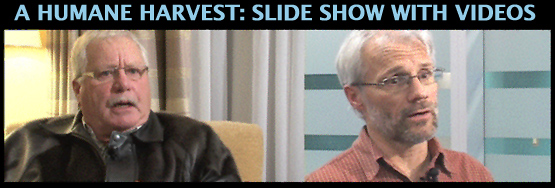SLIDE PRESENTATION, with Dr. Pierre-Yves Daoust, Vetenarian and Mark Small, former president of the CSA, produced by The Canadian Council of Professional Fish Harvesters: Click Here
Background:
The concept of information/training workshops for sealers emerged over the past number of years, largely as a result of the industry’s efforts to ensure that sealing practices continue to improve in terms of their consistency with internationally recognized best practices. It is widely accepted that effective training will form the foundation on which the industry begins to rebuild its international reputation and markets. At recent multi-stakeholder meetings (2007-2013) there has been consensus that seals must be handled in such a way to ensure a humane harvest, with minimum avoidable pain, distress, or suffering for the animal.
To this end, it has been recommended by industry stakeholders that information workshops in Humane Harvesting become mandatory. At the January 2013 Atlantic Seal Advisory Committee meetings in Halifax, Fisheries and Oceans Canada (DFO) committed to making training in humane harvesting practices a mandatory requirement (through either regulatory change or a condition of licence). This commitment by DFO is conditional on industry being able to demonstrate a capacity to reach sealers with the required training in an efficient and timely manner. Furthermore, it is our understanding that many NL seal processors are currently requiring their sealers to have the training as a condition of doing business with their respective companies.
There are more than 11,000 licenced commercial sealers in Newfoundland and Labrador. Approximately 3,400 have received this training in the past four years, 2009-2012, and hundreds more are awaiting training.
Humane Harvesting of Seals
In an effort to ensure that seals are dispatched in the most humane way possible, and in response to recommendations from the Independent Veterinarians Working Group (IVWG), in 2008 DFO implemented a three-step killing process. This new “three-step process” was written into licence conditions for 2008, has continued as a condition of licence in 2009-2012, and will remain that way into the foreseeable future.
In 2009, the Fur Institute of Canada (FIC), with a large group of industry partners, initiated community workshops aimed at engaging sealers on current practices and ways in which they might be improved, including information and explanation on the what and why of the new three-step process. For the first time, veterinarians were given the opportunity to consult directly with sealers on key aspects of hands-on animal knowledge – in particular, it provided adequate opportunity to explain the new three-step process. One of the key outcomes of the 2009 workshops was an industry recommendation that a training program be developed for the Newfoundland and Labrador sealing industry. It was recommended by participants, and endorsed by veterinarians, that this could be achieved in a single-day workshop. Furthermore, it was recommended that this training become mandatory for commercial sealers, and form the basis of a formal certification for professional sealers.
In 2010, the Professional Fish Harvesters Certification Board (PFHCB), acting on a mandate and support from sealing industry stakeholders (Canadian Sealers Association (CSA), FIC, Fish Food & Allied Workers Union (FFAW), NL Department of Fisheries and Aquaculture (DFA), DFO, Canadian Council of Professional Fish Harvesters (CCPFH), and Dr. Pierre-Yves Daoust of the Atlantic Veterinary College & IVWG), continued the work of delivering a half-day Humane Harvesting of Seals training workshop to Newfoundland and Labrador sealers.
The 2010 workshops utilized a Humane Harvesting of Seals workshop module produced by the CCPFH. This module was developed in collaboration with Dr. Pierre-Yves Daoust with financial assistance from DFO, and was further refined following the 2010 workshops. Three workshops were held in the largest sealing areas of the province and a total of 262 sealers attended. These workshops were facilitated by Mr. Ged Blackmore (K-M Productions, developer of the workshop module) and included presentations by DFO Fishery Officers and Dr. Pierre-Yves Daoust.
Economically and Socially Significant
In Canada’s remote coastal and northern communities, sealing is an important part of the way of life and a much needed source of income for thousands of families. Beyond fur, seals are also used to produce meat products and oil products rich in omega-3 fatty acids. The revenues generated from this activity are an integral and vital component of the annual income earned by sealers. This fishery contributes to the diversity of income sources available in fishing communities. In some years, good seal prices or harvests offset lower prices or poor catches in other fisheries.
“When there is a good seal harvest, it can account for up to 30 percent of my salary. Just in the Magdalen Islands there are 900 sealing licences. 900 licences mean 900 families.” Denis Longuépée, Sealer, Magdalen Islands, Quebec.

